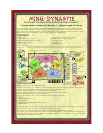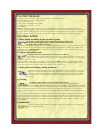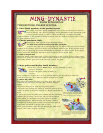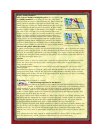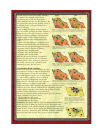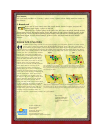
Deploy Family Members
After a player finishes moving his prince, he may deploy up
to 3 family members. In so doing, he may only take family
members from the province space matching the district where his
prince ended his movement and place them into that same
district. The player places the family members into the open area
in the district except that the player can place 1 of these family
members into the cloister in that district, if he chooses. To make
this easier to see, it is best to lay family members flat in the
cloisters. As long as a player has a family member in a district
cloister, he cannot place any more family members into the
district. The family member remains in the cloister until another
player places 1 of his family members into the cloister, thereby
ousting the existing family member, who returns to the district’s
open area. Players may not voluntarily return a family member to
the district from a cloister or oust their own pieces in this manner.
3.2 Leave the prince where he stands
In certain circumstances, a player may not want to move his prince, yet he also may not want to
pass (3.3). In this case, the player can leave his prince in the district where he currently stands.
To do so, he must play a movement card of his choosing (or a dragon card) to the discard pile.
The player may still place family members in the prince’s current district in the same manner as
he can after moving his prince (3.1).
3.3 Pass
If a player cannot or does not want to play a card, he can pass and then sit out the rest of the
phase. The player does not have to play a card to pass, but he does not get to deploy any
family members either.
The remaining players continue the round, taking turns and skipping any players who have
already passed.
This means that players may end the phase with different numbers of cards in their hands. The
players must keep these cards for the next round. Family members remaining on the province
spaces must remain in place for use in the upcoming round. Players may not move or exchange
family members on the province spaces.
4. Scoring (only in rounds 2, 4, and 6)
4.1 Determining majorities in the districts
The cities in the provinces each contain 9 houses. These houses are divided by
district, so that there is a set of 3 houses connected to each surrounding district.
Family members in a given district may only be placed onto the 3 houses connected to the
district. Therefore, there can be a maximum of only 3 family members in that district’s city
section at a time. Family members in cloisters do not count when determining majorities, and
players may not move them into the city.
The player with the most family members in a district must move 2 of his family members from
that district into the connected city houses. If a player has only 1 family member in a district and
still wins the majority, he moves just that 1 family member into the city. The player with the
second most family members must move 1 family member into the connected city.
If 2 or 3 players tie for the most family members in a district, each moves 1 family member into
the city. In this case, the player or players with the second most do not get to move any family
members to the city, and 1 house will remain empty. Players with the second most family
members may never move as many family members to the city as the player or players with the
most.
If all 4 players have the same number of family members in a district, none of them gets to
move any into the city, and all 3 houses in that district’s city area remain empty.
The player moves one of the transferred
family members to the cloister.
The player places two family members in
the district where his prince stands.



